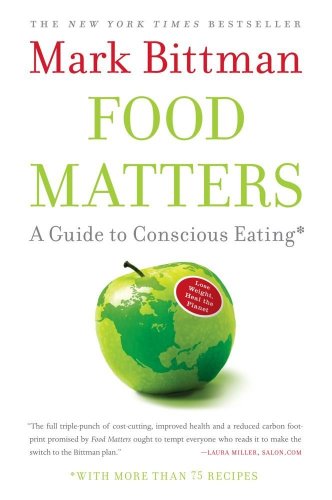29 Mar
Food Matters

Surprise surprise! I found another non-fiction book on food that I love and think you should read. Although I love Mark Bittman’s cookbook How To Cook Everything, I wasn’t planning on reading Food Matters until my friend Janssen asked me if I had read it yet. She gave it a thumbs-up, and since she reads over 100 books each year, I figure she’s a pretty good judge of what’s worth reading.
I took some notes while I was reading to try to better capture why I think this book is worth your time:
- I didn’t know this, but if you add up all of the people in the US, and all of the fruits/vegetables grown in America, there isn’t enough supply to meet the demand of 5 servings of fruits and vegetables each day. Why are we growing so much corn and soy when we don’t even have enough carrots for everyone?
- We all need to eat less meat. Those who consider themselves carnivores (although as Michael Pollan once pointed out this is an incorrect label and omnivore is a better term) feel defensive when people talk about eliminating some meat from their diet because they are used to vicious attacks from vegans-who-give-veganism-a-bad-name. I like the way Bittman starts the section on eating less meat:
I’m going to skip most of the deplorable stuff about factory farming. In fact any detailed description of growing animals industrially (the word “raising” is really misapplied here) would sicked anyone who has even the slightest feeling for other species (this includes all pet owners who are not extreme hypocrites), or who believe that the earth is to be shared by all creatures (except maybe mosquitoes), or who believes in fairness, justice or kindness. - Page 26
- I think his instructions work because he sprinkles in confessions of his own bad habits in other places. On page 73 he admits that he “attacks” good white bread on the table at dinner, and casually says that every few months he indulges in a cheeseburger, fries, and a Coke. He is real guy, doing what real people do. This is not an unattainable diet for the average American.
- His advice on page 78 about dealing with hunger during weight loss attempts is practical, and he describes embracing hunger much better than I did here.
You can also embrace hunger, strange as that may sound, just as you might embrace the delicious anticipation of a nap, or sexual craving. Your hunger will, after all, be satisfied; why not wait an hour? (You’re not dying after all!) You might also stop eating before you’re full (three-quarters full is probably about right). And if you eat slowly, taking your time, you’ll give the food time to reach your stomach and give you a sense of satisfaction before you have seconds or thirds. - Page 79
- He hints that some recent research suggests that excess protein intake may be related to the immune malfunction that causes food allergies. I am very interested to see how this pans out.
- The best part about this book is that it’s filled with arguments to change your eating, and then gives you recipes to make it happen! He lays out 4 weeks of meal plans using the recipes in the book (would someone puh-leeze write a seasonal cookbook that applies to the mid-west already? Or for Texas?), but my favorite section is Six Seasoning Blends You Can’t Live Without on page 143. I mostly rely on dried basil (I know, I know, fresh is so much better!), salt, butter, and cheese, to flavor my dishes, but this section has really influenced the way I cook and help me experiment with unique flavors. Anyone who reads my food blog knows that I need a lot less saturated fat in my life! (Mmmmm, cheese….).
- Other recipes I cannot wait to try. More-Vegetable-Than-Egg-Frittata, Whole Grain Pancakes, Hummus with Pita and Greens, Paella, Cassoulet with Lots of Vegetables, Coconut and Nut Chews, ALMOST NO WORK WHOLE GRAIN BREAD. Oh yeah baby, I am super stoked about that last one.
The copy I read and used to write this post is from the library, I plan on buying the digital version for my ipad in the near future. If you’ve used any of the recipes from Food Matters I’d love to hear your favorites.


 I'm a farm-raised almost-crunchy stroller-pushing picture-taking lifestyle-blog-writing gastronomy-obsessed divine-seeking thrift-store-combing cheese-inhaling pavement-pounding laughter-sprinkling lover of individuality and taking chances.
I'm a farm-raised almost-crunchy stroller-pushing picture-taking lifestyle-blog-writing gastronomy-obsessed divine-seeking thrift-store-combing cheese-inhaling pavement-pounding laughter-sprinkling lover of individuality and taking chances.












This book blew my mind. I picked it up because I also own Bittman’s How to Cook Everything (a great cookbook, by the way) and read the whole thing in almost one sitting.
I can’t remember the name of the recipes right now, but there is a lentil dish that is wonderful, and the whole grain flatbread is good too.
After you read this, try the Food Matters Cookbook. It came out last fall. Some of the recipes overlap, but it is a full length cookbook based on the same principles. I got the cookbook for Christmas and I love it!
1I read this book in February and loved it as well! I noted the seasoning blends and the wheat bread recipe, but I didn’t try any of the full on recipes.
I really, really liked the thoughtful, logical way he broke down the protein argument. I appreciated how he put it into a global perspective, then mentioned our own recommendations being higher than most suggestions, then mentioned “oh, and we still blow way past our own (already high) recommendations”. I also liked how laid back and conversational it was, instead of being preachy and passionate. He’s very calm about it because he relies on facts, not emotions and hyperbole, and I find that appealing in any persuasive argument.
I wish that more die hard veg*ns and PETA members would realize that most people are not going to give up meat, and the best thing is to educate people on why they should reduce their intake, and why the meat they DO eat should be humanely, naturally raised, fed, and slaughtered. Bittman takes this approach, and he has gotten flack for it from vegans, but the way I see it he’s “converting” waaaaaaaay more people than any militant vegan. If he convinces thousands of people to eat this way that is still, on the whole, a net positive that is greater than a militant veg*n who manages to convert 5 or 10 people.
Glad you liked the book!
2This sounds like a great book! Once I graduate from school in May, this will be one of the first books I read. I love to read about the food industry, I’m also planning on reading Michael Pollan’s books. Thanks for the review!
3You might enjoy the salt-free seasonings from this place. They are distant relatives-I use these spices for EVERYTHING!
http://www.savoryspiceshop.com/blends/sfblends.html
4Sounds like a good book I should pick up. I love people that write healthy eating books with moderation and normalacy in mind - especially with food, it’s hard to live in the land of extremes in either direction. I could never live on a traditional Atkins diet, nor do I think I’d ever want to be vegan (though it does intrigue me!).
I love what you quoted about being hungry. Our bodies sometimes overtake our minds and tell us EAT, EAT NOW, YOU’RE HUNGRY thinking we are still in caveman times where food is more scarce and takes time to wrangle up. Our mind needs to remind our body that we do indeed live in a place where food is plentiful, so if you choose to wait another hour to eat and don’t give into the immediate hunger cues, it really will be okay. Though I must say that hunger is not my problem - - it’s eating out of boredom, sadness, stress, anxiety….;}
Thanks for the reccommendation!
5http://www.amazon.com/Farmers-Market-Cookbook-Seasonal-Ingredients/dp/1585741310
I checked out this book from the library last night (yay libraries!) and it is organized by season based on what is available at the farmer’s market depending on the time of year.
Maybe this might be interesting to you!
6Sounds interesting.
I disagree with the idea that we are intaking too much protein, though. Maybe for our average caloric output, but as an ideal diet, we might not be taking in enough. Most anthropologists believe that our bodies are adapted to a Paleolithic era diet, which was much higher in protein an fiber, and much much lower in salt, fat, and sugar.
Sophia Reply:
March 29th, 2011 at 8:21 pm
I 100% agree with you in part- about the salt, fat, and sugar- but at the same time I doubt that Paleolithic ancestors were able to eat meat three times a day, every day. Most of the people I know that eat meat do eat it three times a day, every day. And furthermore, they eat huge portions of it, and it’s usually not grass fed, all natural meat.
Paleolithic era humans were hunters and gatherers, and everything I’ve read is that it seems that the gathering portion got them through the times when hunting was not successful. The Paleolithic era started about two million years ago, but the bow and arrow was only invented about 20,000-40,000 years ago. Hunting was hard, dangerous, and often fruitless work. Meat was an important part of the diet, no doubt- NPR did a fascinating feature on how hunting made us human, and allowed us to have larger brains due to such dense caloric food- but still, I would say it is almost impossible they were eating it even every other day. Probably twice a week, at most, considering all the external factors, although of course that’s always hard to say due to a bit of conjecture. Most of what I’ve read says they estimate hunting was successful about 20% of the time at most.
Personally, when I say people are eating too much protein, I mean that every one I know that isn’t a vegetarian eats large portions of meat three times a day, pretty much every day. And even considering Paleolithic diets, I think that is *way* more than we evolved to eat/were used to eating back in the hunter gatherer days. As a side note, I researched the Paleo diet extensively a few years ago, my cousin follows it, and I do see a lot of merit in it. But even she measures out her meat in what most people would consider very small portions, and she only eats grass fed, all natural meat. My friends that eat fast food still eat far more meat than she does, even though she follows the Paleo diet.
Jackie Reply:
March 29th, 2011 at 8:32 pm
I agree that people in the paleolithic era didn’t eat meat 3x a day, especially not year around (I’m actually getting my master’s in anthropology!) There are many sources of protein; nuts were a big source of food for many groups in the paleolithic. Whole grains are also higher in protein than processed grains. Fish, depending on the region, were also a major source of food and protein.
I think it matters more the source of the protein, than the protein itself.
Sophia Reply:
March 29th, 2011 at 9:22 pm
I agree the source matters more, for sure. This has just been on my mind because over the last year or so I’ve been reading about the “hunting made us human” and “persistence hunting” theories, and as a vegetarian I’m pretty much always asked the “but how do you get enough protein?!” question so it’s something I’ve read about and studied a lot from a personal perspective. But definitely not master’s level study
This sounds like a very interesting book! I’m always interested in hearing about different peoples takes on dieting, hunger, etc. Thanks for sharing!
8I loved this book too, as you know.
What did you think about Eating Animals? Worth reading?
caleefille Reply:
March 29th, 2011 at 11:46 am
Jonathan Safran Foer read a bit of the beginning for a free podcast on Vanity Fair’s Writers Reading Podcast. Hearing that helped me decide that it would probably be a worthwhile read-you might want to check it out!
Jenna Reply:
March 29th, 2011 at 12:35 pm
I wrote about Eating Animals here: https://thatwifeblog.com/2010/08/eating-animals-2/
Putting this on my wish list right now. I’m still listening to Henrietta, but I think I’d going to have to get this one in hard-copy if it has good recipes in it. Thanks for another great suggestion, Jenna! I love that you and I are on the same wave length on these issues, even if I love my baking too much to give it up yet
10We are growing so much corn because the Gov. pays subsidies for corn…alot of susidies…They are pushing it as an alternitive fuel source. But it takes ALOT of energy to make that corn into ethenol. I believe we should have enough food to feed the people before we make fuel for cars. We should not be importing food that we can grow ourselves!
11Great review! Since at some point you mentioned that maybe you will be moving to Europe in the long run, I was wondering if you (already) try to find out how things are over here eating-wise. What differences there are etc.? If yes, I would love to hear what you found out.
12Thanks for this recommendation-I will definitely check it out (sooner or later). Other thoughts-
131. Herbes de Provence (a spice blend) is magic. I maintain it can be used to flavor anything savory (meat, roasted veggies, and tomatoes are my favorites) with great success. And don’t be afraid to be liberal with the amount.
2. I think I’d buy this book just for the recipes. Holy Toledo, will spring just arrive already? I’m about over the moral dilemma of choosing non-local veggies when I’m tired of potatoes.
3. I’m glad you and everyone else is so positive over Mark Bittman’s cookbook…I just never got into it. I’ll have to give it another try.
Can’t wait to read this! And we are Mark Bittman blog jinxies today!
14This book looks awesome, definitely going on my “to read” list.
15I too rely heavily on dried basil. Whenever I buy fresh herbs they always seem to lose their freshness before I’m ready to use them.
I have Bittman’s Food Matters Cookbook - the recipes all seem simple, and he offers ideas of how to switch up the recipes based on what you have on hand. The cookbook has made me really want to read Food Matters & also made me branch out in the kitchen.
16I love Mark Bittman and I love the Food Matters cookbook. I read Eating Animals and while it opened my eyes a lot, I am just not going to become a vegetarian again. Also, I did not like the hyperbole in Safran Foer’s book about comparing animal rights to the civil rights movement. Say wha? Bittman is more balanced and realistic.
17I just picked this book up about 3 weeks ago. I have Mark Bittman’s How to Cook Everything Vegetarian. Although I myself am not vegetarian, my fiance and I are and have been trying to cut more meat from our diet. This vegetarian cookbook is so practical to have. I find so many of my side dishes from it. There are recipes for every vegetable imaginable.
Food Matters…I love this book, but haven’t finished reading it. Reading, working and raising a 9month old don’t go to well together. I love that he places emphasis on making this low meat diet flexible and encourages you to tailor it to your lifestyle. Lifestyle changes and diets don’t have to be extreme. A little change can go a long way.
I love how he says to first focus on reducing the amount of meat you eat, then if you master that you can start to work on eating organic and local. This can really help the average person who may become overwhelemed by the organic/local mantra, and may not know where to begin.
Highly recommend!!!
18Thanks for the suggestion. Adding it to my library queue stat!
19I’ll have to add this to my list. Thanks for the suggestion!
Thanks for the suggestion!
20i have the food matters cookbook and ADORE it. there are close to a bajillion recipes in there — and i want to make them all!
21You should really start using fresh herbs. They make a dish so much better than dried. Also, one of the most overlooked herbs is Italian parsley. Adding it to your dish at the end is a great way to “freshen” up what you are cooking.
22My husband and I own a restaurant and we cater lunch to PETA’s office every now and then. They are very strict, we can’t even use honey in our salad dressings!
Oh Jenna - we’ve found something that we disagree on!!
Buying e-books to read on the iPad… AHHH!!!! Noooo!!! STOP THE MADNESS, save the libraries, save the brick and mortar book stores!! If not, the education divide in America is going to widen as literature becomes harder to access in printed word and more expensive. AHHHH!!!!
(Disclaimer: I still like you and promise not to raise this repeatedly for the rest of our e-relationship. Hyperbole and exclamation marks used, in part, for dramatic emphasis)
Jenna Reply:
March 30th, 2011 at 8:53 am
Haha, I’m glad this won’t destroy our e-friendship. But, I’m sorry, we plan to convert to all digital everything eventually. It just doesn’t make sense for us to drag all of our books from Chicago to Texas and then Texas to wherever. And then what about when/if we move to Europe?
I am curious if anyone has ever written anything on whether technology will eventually become so inexpensive that e-readers will be the way to go for everyone?
Sophia Reply:
March 30th, 2011 at 10:45 am
I think there are positives in this area- my local library is growing, they’re actually expanding and doubling in size. And they offer e-books you can check out, for free. Every library I’ve used recently does, but it might take a while for every library to catch on with that.
Personally, I have no problem with brick and mortar stores like Barnes and Noble, Borders, etc., disappearing- IMHO, they’re super expensive, over priced, and from a consumption/energy/resource/financial standpoint I would much rather see people buying used books (these stores are still thriving, such as Half Price Books), or using digital copies, or going to the library. I would be fine in a world with libraries and e-book readers, and random used book stores. I’m very frugal and gave up buying books (I’m an avid reader and pretty much never read anything twice, so because I love reading so much libraries make far more sense). I move a lot too, and I’ve gone from being someone who bought $40 worth of used books a month to being someone who is giving away my personal library and moving to only library books/e-books.
I think it’s important to remember that books used to be very, very expensive as well when they were first in circulation. Eventually, they became very accessible. I think the same thing will happen with e-readers. They’ve already dropped tremendously- 3 years ago my friend got a Kindle for almost $400. This year, I got an e-reader for $99, and I imagine it will only continue to drop, as most technologies do. Google Books has over 3 million books, for free, that anyone who has access to the internet can read. They can also be downloaded into e-reader format.
I actually wrote a pretty extensive blog post on how shocked I was that I came around to e-readers. I openly loathed them, made fun of them, and thought they were terrible. Then I realized how convenient, practical, and frugal they were for my lifestyle. Oh, one other thing- e-books actually make publishing one’s book *more* accessible, because the costs of printing are gone, you don’t have to have a publishing house, etc. Many people have been very successful in writing and selling e-books that may not have made it to the print market. I see that as a good think in democratizing the spread of information, since very specific, niche markets can be catered to in the digital book field that would be ignored by big publishing houses.
I have to admit, I never really understood buying books. How often do you read a book more than once? My husband has tons of books that he’ll never look at again, and I who am just as an avid of a reader, have just a handful of ones I like to reread or I couldn’t find elsewhere. Usually I just buy used. I’m all for the libraries.
Sophia Reply:
March 30th, 2011 at 6:21 pm
Same here! I had that revelation when I looked at a friend’s extensive DVD collection- over 200!- and I thought “what a waste of money, you’ll never watch it again”. Then I realized how hypocritical that was, because *I* had three huge bookshelves of books, and I never re-read them either. It was one of those “a-ha!” moments. I thought I was doing good by buying used, but still, the library was right. down. the. street. and my tax money was already paying for those books, why wasn’t I just using that?
Oops, that last one was supposed to be a reply to the above conversation.
Anyway, have you read this article http://opinionator.blogs.nytimes.com/2011/03/29/why-were-fasting/?smid=tw-bittman&seid=auto by Mark Bittman?
Jenna Reply:
March 30th, 2011 at 1:25 pm
I read it today actually! TH thinks that we need to eliminate the ability for rich people/corporations to skip out on taxes, and to figure out a new way to do estate taxes. I agree with him. It’s sad to hear how the poor can’t get enough to eat
Jackie Reply:
March 30th, 2011 at 1:39 pm
Totally.
I know you guys are big budgeters (and don’t really know where you stand on politics, so excuse me if this is offensive!) but I think you’ll appreciate his analogy. Whenever I hear about the “budget crisis” I think about what my husband and I would do if we found ourselves broke. We’d have two choices 1) cut back on spending or 2) take in more money. We can cut back in some areas, but we only so much. If we can’t afford to eat, then we’ve cut too much and need to start taking in more money! I think its the same with the country. We should cut in superfluous areas, but when not everyone can afford to eat…we have a problem And the problem isn’t overspending, it’s much bigger systemic economic problems that we need to address!
Jackie Reply:
March 30th, 2011 at 1:41 pm
P.S. I’m doing my master’s thesis on how homeless people decide what to eat, so its an issue I’m really interested in!
Sophia Reply:
March 30th, 2011 at 6:24 pm
When I hear about how GE made 15 billion in profits but paid no taxes, and instead received 3.2 billion in tax breaks it makes my head spin. Same with HP- they made 9 billion in profits but also paid no taxes and got tax breaks. Craziness. And unemployment is still in the double digits, even as corporations post record profits…
I think closing those loopholes would help the economy a lot more than cutting a million here and there to programs that help the less fortunate
How does this book compares to In Defense of Food?
Did you feel it completed it, or is it a lot of repetition?
I agree on the seasonal food. I always get frustrated when I see a “winter” recipe calling for fresh herbs or a whole tomato. Hello they are only in cans if you are to eat in season in Marhc.
For the bread, you should check out this recipe
http://www.progressivepioneer.com/progressive-pioneer/2010/03/no-fail-whole-wheat-bread-its-not-dense.html
I totally fell in love with it. So easy to make and oh so, so good.
I’ve struggled with the bread machine to make 100% whole wheat (too dense). It takes a little more handling than the bread machine version, but it’s ready a lot faster.
Jenna Reply:
March 30th, 2011 at 1:25 pm
It’s repetitious (though by now I’ve read enough that it’s hard for me to read what book contains what) but I think it’s a bit more approachable than anything else I’ve read.
What would you recommend more… the Bittman cookbook in actual book form or the cookbook on iPad?
Jenna Reply:
April 6th, 2011 at 4:17 pm
Can you check out the book from the library (to get the information) and buy the cookbook on the ipad? That’s what I’mg going to do.